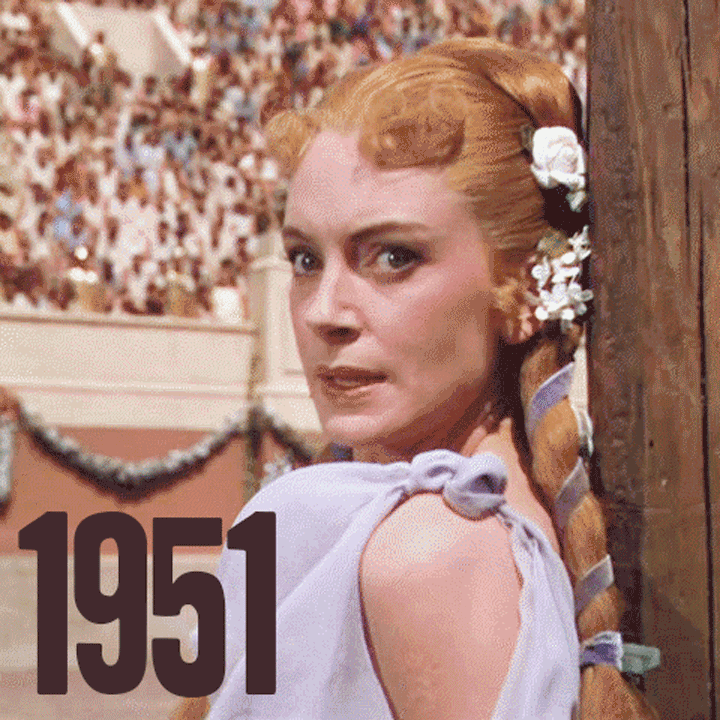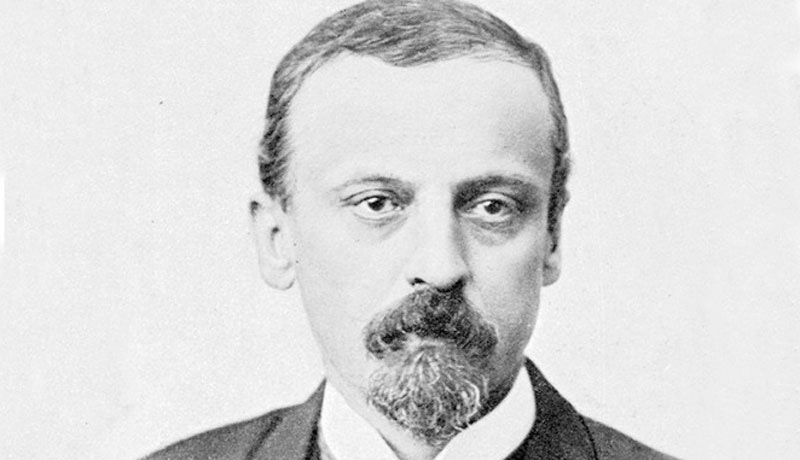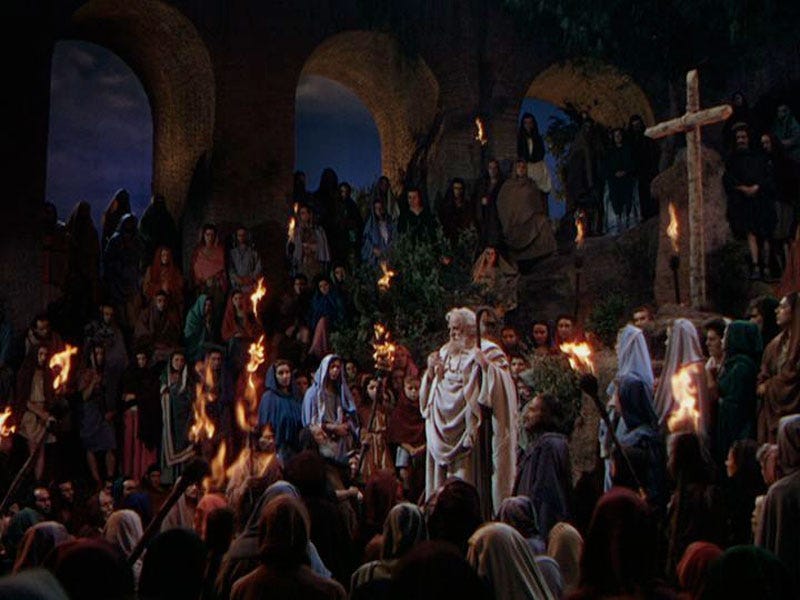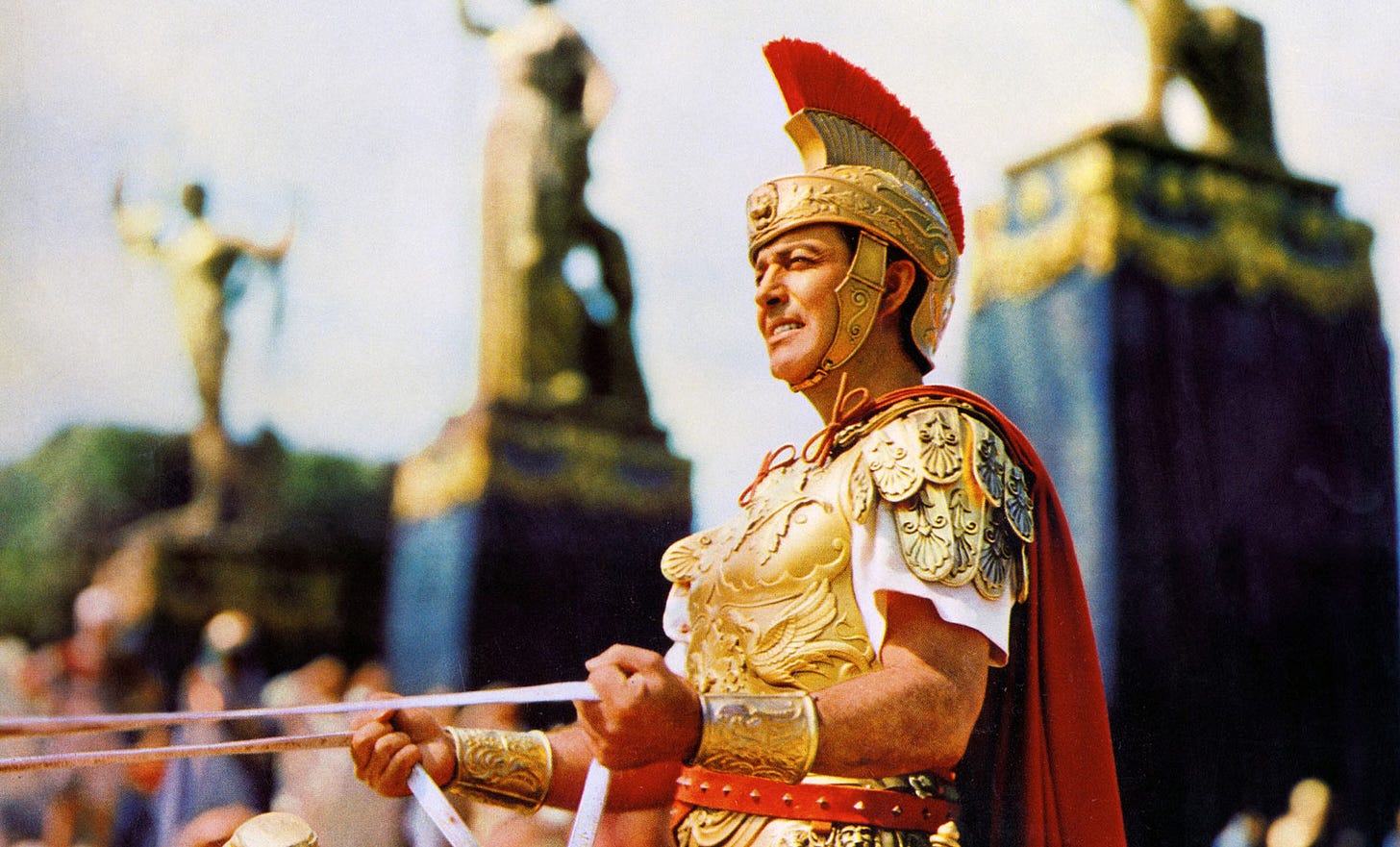GROSS/42 1951 part two - Quo Vadis is a twentieth-century Gothic cathedral
A vast, sanctimonious biblical epic.
Gross is every year’s top-grossing movie, since 1913, reviewed.
QUO VADIS? Director MERVYN LEROY, cast ROBERT TAYLOR, DEBORAH KERR, LEO GENN, PETER USTINOV. production company MGM, released 1951, 171 MINUTES.
I’m going to keep this short. I mean part one was exhausting. Although I am now an expert on post-war Italian politics. AMA.
Quo Vadis is a mid-century blockbuster, a vast enterprise. The most expensive movie ever made. We take this for granted now but, in Hollywood, cinema went from hobbyist medium to complex industrial concern in the blink of an eye. The life of this project, the years of stalled and abandonded productions and its final scale are case-study material. It’s huge, along every dimension: a twentieth-century Gothic cathedral.
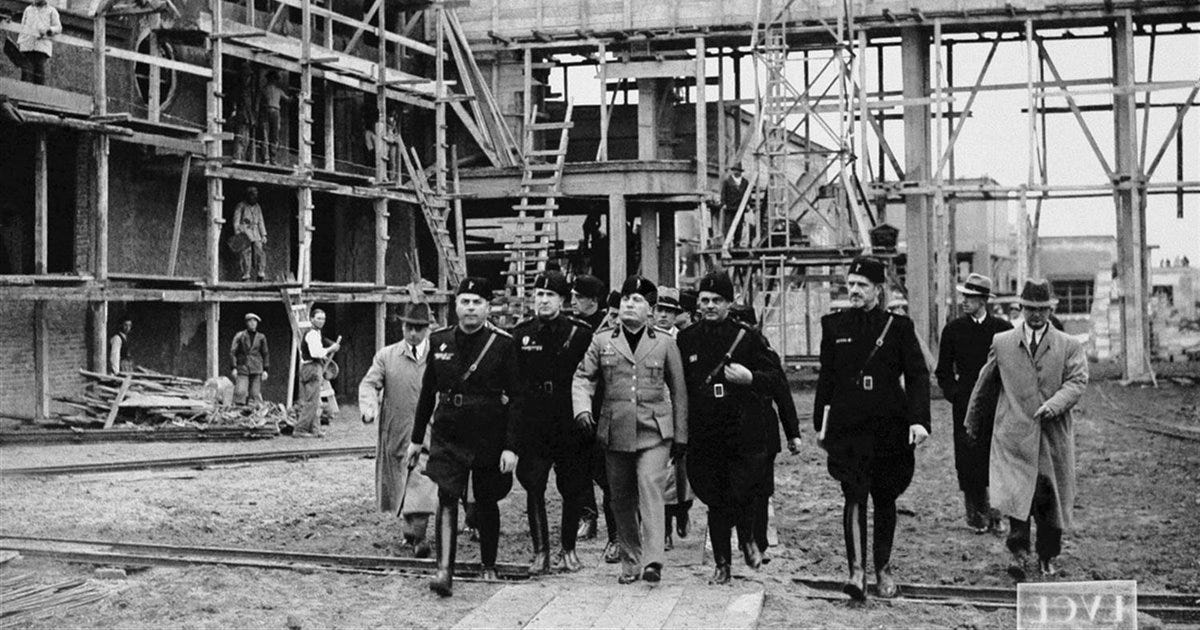
Years in the making. The project began in 1934, seventeen years before its final release. Several attempts to make the film stalled - including a Benito Mussolini co-production (I kid you not) and a couple of wartime efforts in Hollywood. The 1951 release was critical to the rebuilding of the dead dictator’s huge Roman vanity project, Cinecittà, and equipping it for the first republic and for Italy’s post-war cinematic golden age.
The source. There’s a deep back-story to this adaptation of a late 19th-Century potboiler that would need half a dozen posts on its own. The author, Henryk Sienkiewicz - who won a Nobel Prize for his series of historical epics - was a Polish nationalist and a Catholic apologist. The book connects the persecution of the early Christians in the pagan Roman Empire with the ancient suffering of the slavic peoples. As far as I can tell the novel’s been translated into English twice and both translators fully buy into the ideological project. They’re translating a polemic packaged as an adventure.
Persecution. Predictably enough the suffering of the Slavs doesn’t make it into the movie but Hollywood fully bought into the Sienkiewicz schtick anyway. The novel’s Catholic histrionics were easily translated into a more relatable parable about freedom and autocracy. In this version, the Romans are either Nazis (plausible, it’s 1951, after all), Communists (also plausible, it’s 1951 after all) or - in a more general sense - generic, godless cosmopolitans (also plausible, see above).
The Romans have all the best lines. They’re sadistic, amoral, cowardly or just weird but we love them anyway - and certainly more than we love the self-righteous Christians, awaiting their fate in prayer. Ustinov gives us grade-A (Golden Globe-winning) murderous narcicism, swishing round the Palatine Hill like an unhinged Dick Emery character. We are, of course, meant to identify with the Christians - dullards attired in humble earth tones - as they cower in their villages but they’re impossibly annoying and once they arrive at the Colosseum (maybe this is just me?) we’re rooting for the lions.
Righteous. We’re given a frankly sanctimonious, storybook account of the travails of these early Christians. While we’re supposed to make various semi-conscious associations between the Romans and the whole menu of 20th-Century totalitarians; for the Christians it’s with the hard-working people of middle America. It’s an awkward fit - the ascetic, turn-the-other-cheek grace of these first-generation Jesus followers is obviously at odds with the pragmatic protestantism of the American audience (a Chevy on every driveway, a Frigidaire in every kitchen…) but the contradictions are smoothed over. These early believers are essentially generic.

The war is over, the cold war is under way. In the United States the contest is about what kind of republic can possibly follow the epochal chaos of the previous half century. FDR and his self-confident wartime state are a fading memory. In Quo Vadis, a pre-sectarian Christianity, vaguely characterised, is offered as a successor for the decadence and cruelty of the preceeding regime. We get the point but it’s clumsily made, mendacious even.
What the critics loved - and they did love it - was the unprecedented scale of the thing - the de-luxe, gold and purple and crimson art direction and the gorgeous Technicolor. Variety called it “…a super-spectacle in all its meaning.” The LA Times “one of the most tremendous if not the greatest pictures ever made ... Its pictorial lavishness has never been equaled in any other production.” They’re not wrong.
I’ve been ungracious about Quo Vadis. It’s not a wicked or mean-spirited film, it’s good-natured, a genuine, high-energy romp - and it became essentially the definition of an epic.
Quo Vadis is on Amazon Prime and elsewhere. There’s a Blu-Ray.
A lot of this stuff comes from this really splendid book chapter by film academic Jonathan Stubbs: ‘A more permanent world’: Quo vadis (1951), Runaway Production, and the Internationalization of Hollywood.
Stubbs says the custom of casting British actors in the elite roles in these classical epics may not have been the ‘cultural cringe’ we’ve been glibly assuming all these years but may be a response to the capital controls imposed by European governments after the war - casting local talent was a way for American studios to use funds that couldn’t be repatriated.
Part one of this post is about the somewhat awe-inspiring economic and historic context for this movie.
Pauline Kael relayed a Quo Vadis gag that was going round, about a: “…little old lady who said in the middle of QUO VADIS, ‘Look, there's a sweet little lion who hasn't got a Christian’.”
Philip French, a wise man whose reviews I read for decades, was taken in by this gigantic propaganda piece, writing that Quo Vadis “…uses the past to examine issues of the present: fascism, communism, the Holocaust, US imperialism, the need for a new spirituality.”
Ustinov’s stories about the production are good value. He was 28 when he signed on as Nero, 31 when the movie was released. Ustinov could be mistaken for one of those grand actors traduced by Hollywood but he knew he was really a comic who lucked out - a brilliant common-room mimic who won two Oscars. He was able to rationalise his participation in this monstrosity: “The inevitable vulgarities of the script contributed as much to its authenticity as its rare felicities. I felt then as I feel today, in spite of the carping of critical voices, that Quo Vadis, good or bad according to taste, was an extraordinarily authentic film, and the nonsense Nero was sometimes made to speak was very much like the nonsense Nero probably did speak.”
You won’t be surpised to learn that Quo Vadis absolutely brutalises the history for the sake of the story. We know there were only a few thousand Christians in the whole world at this point and that theirs would not be the official religion of the Empire for nearly 300 years. It seems exceptionally unlikely that Peter was in Rome or crucified by Nero. I could go on. I’m being pedantic but this great big, silly movie depends on this kind of elision.


